MENU PICTURE
Home

© Copyright SUPPHOTO 1999
All rights reserved |
Picures of the history of
the TGV,
the most speed train on railway
All rights
reserved © "Le Train"
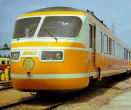 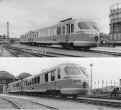
The adventure of the great speed begin in years
55 with a first record of speed at 331 km/h realized by a serial locomotive. The necessity
to connect cities more rapidly pushes the SNCF (the constructor) to develop new projects
then in 1967 the TGS (gas turbine) sees the day and the 19 October 1971 it reaches 252
km/h.
|
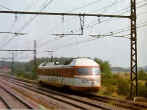 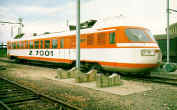
Always following the principle of gas turbine
the TGV 001 appears in April 1972, and beats a first record the 3 August 1972 with 307
km/h then 318 km/h (its record) the 8 December 1972. It is necessary to wait March 1973
date of the oil crisis to see to arrive the first projects of a large train electrical
speed being estimated that it would be necessary 9 fuel liters by traveler and by
kilometer to make advance a TGV 001.
|
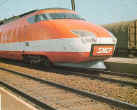 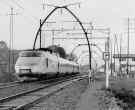
And therefore similarly to TGV 001 begin in 1974
test of the Z7001 whose role was to help to the development of the pantograph but equally
and especially for the development of the braking and the boogies (organ of roll). One
sees thus the first records of speed of an electrical train on rail namely 306 km/h 5 July
1974.
|
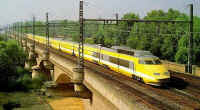
Le TGV
"La poste" |

The TGV in
september 1981 |
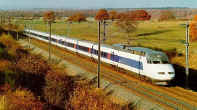
The TGV
Atlantique at first |
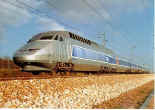
The TGV Atlantique at the
final version
The association of all its drawn
results of experimental train tests give birth the 25 July 1978 to the known TGV in its
current form although since TGV have not ceased to follow by technological evolution
forever more comfort and large security speed. This oar reaches 260 km/h then 280 km/h the
23 August 1978 with a record of 380 km/h the 26 February 1981. 10 years later the ATLANTIC
TGV the other great evolution of the classic TGV beats the absolute speed record on rail:
the mythical 515,3 km/h but the adventure continue...
The TGV fascinates you ? You
want all to know its history ? Click here
|